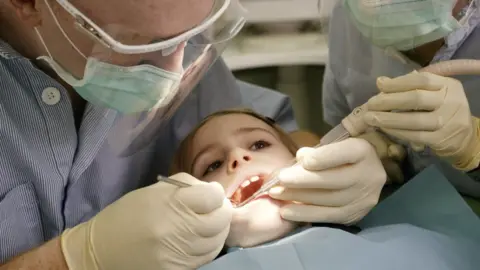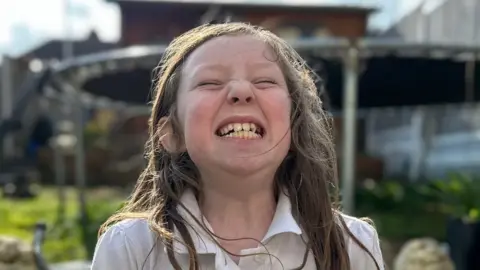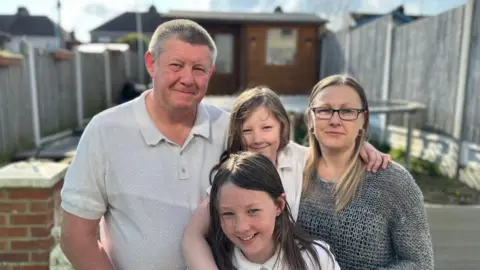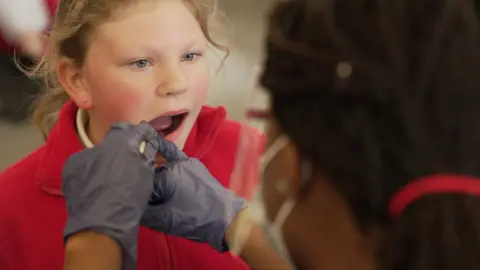Children waiting over a year in pain for NHS tooth removal
 Science Photo Library
Science Photo LibraryChildren in some areas of England are waiting up to 18 months on average for dental general-anaesthetic treatment and teeth extractions, an investigation reveals.
Some have been left with prolonged dental pain, according to information shared with BBC News.
The parents of one girl who has waited three years for extractions say the pain keeps her up at night.
Removing decayed teeth is the most common reason for needing the service.
Rotten teeth
At the start of this year, more than 12,000 under-18s were on waiting lists for assessment or treatment at community dental service (CDS) providers, data obtained by the Liberal Democrats from the NHS Business Services Authority and shared with BBC News earlier this year reveals.
Children are referred to a CDS provider when they have tooth decay too severe to be treated in general practice.
They also treat those with physical or learning disabilities when general practice is not a practical option.
The longest average wait faced by children for general-anaesthetic treatment at a CDS provider is 80 weeks, at Harrogate and District NHS Foundation Trust.
But some providers have much lower average waits - at Mersey Care NHS Foundation Trust, it is just three weeks.
Ella Mann, eight, from Dovercourt, Essex, has been waiting three years to have rotten teeth removed.
 BBC News
BBC NewsShe first went to the dentist with a painful milk tooth in December 2019, was given a temporary filling and told it needed to be removed but has still not had the NHS procedure - and now, seven more of her milk teeth need to be removed.
 BBC News
BBC NewsElla's father, Charlie, says the pain "keeps her up at night".
He says: "It always seems to be in the evening that she suffers the pain. So then obviously we've got the problem of overnight and then fatigue because obviously she's awake most of the night.
"She's started to sort of resent brushing her teeth because it's giving her pain - and we're starting to get concerned it's going to cause further problems.
"You're waiting and waiting and waiting for something to be done about it. They are doing temporary fillings. They're doing temporary jobs on it.
"It's just not right that children should be waiting."
Decay-related extractions
Tooth decay is the most common reason six- to 10-year-olds are admitted to hospital.
In England, more than 42,000 teeth were extracted from under-19s in 2021-22, costing the NHS an estimated £81m.
Office for Health Improvement and Disparities analysis reveals a gap between regions in England.
In the 2021-22 financial year:
- Yorkshire and the Humber had the highest rate of decay-related extractions for under-19s, 378 per 100,000
- East Midlands the lowest, 71 per 100,000
Staff at Maybury Primary School, in Hull, are doing their best to help keep pupils' teeth healthy.
Every pupil brushes their teeth after lunch.
 BBC News
BBC NewsHead teacher Alison Grantham says toothache "has a massive impact on learning because they're missing lessons".
"And if you're coming to school and you're trying to concentrate and trying to learn while you're in pain, then that's going to have impact, too," she says.
"Trying to get dental support in this area, it is really hard for parents to sign children up for a dentist. This area that the children come from, there is a high level of tooth decay.
"We don't like to see any of our children suffering or in pain - but a lot of the time, there's something you can do straightaway that can help that. "But with teeth, it's far more difficult. There's no magic solution."

Some people are going to extraordinary measure to do DIY dentistry as they struggle to find affordable dental care. Are we witnessing the death of NHS dentistry?

'Exceptionally high'
Dentists from the charity Teeth Team visit children at primary schools across Hull and parts of East Yorkshire. And BBC News joined them at Maybury Primary in May.Among the 169 children given a dental check-up that day, there were 263 decayed teeth.
Some of these children will need extractions under general anaesthetic in hospital.
Sara Feldt, from Teeth Team, says the needs in the school are "exceptionally high".
'Limiting sugar'
"A high proportion of those are in urgent need, which is four or more decays or cavities in the children's teeth," she says.
"We've had two today that have told us that they are in pain. One told us that they've got an abscess, so we're going to deal with that.
"It's disturbing. It's not very nice to see, because a child's going under a general anaesthetic for something that's preventable. It doesn't have to happen.
"Good oral hygiene, regular toothbrushing, limiting sugar, limiting the fizzy drinks. We need a little bit more education out there to prevent this happening.
"I like the fact that we're coming into the schools, because sometimes that's the only kind of time the children will see a dentist.
"We all know that the access to a dentist at the moment is really difficult. So to be able to do that, I think it's really positive.
"It needs to be rolled out nationwide, not just Hull."
A Department of Health and Social Care official said: "We are working to improve access to NHS dental care - investing more than £3bn a year into dentistry - and the number of children seen by NHS dentists rose by 43.6% last year.
"We have increased the funding practices receive for urgent care, to encourage dentists to provide more NHS treatments and we're also taking preventative measures to improve children's oral health, such as expanding water-fluoridation schemes - which can significantly reduce the number of children experiencing tooth decay. Further reforms are planned for this year."

Are you a parent whose child is experiencing a long wait for dental treatment? You can share your story by emailing [email protected].
Please include a contact number if you are willing to speak to a BBC journalist. You can also get in touch in the following ways:
- WhatsApp: +44 7756 165803
- Tweet: @BBC_HaveYourSay
- Upload pictures or video
- Please read our terms & conditions and privacy policy
If you are reading this page and can't see the form you will need to visit the mobile version of the BBC website to submit your question or comment or you can email us at [email protected]. Please include your name, age and location with any submission.

Sign up for our morning newsletter and get BBC News in your inbox.

